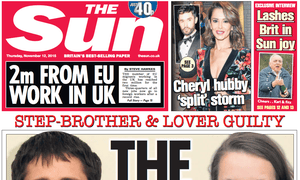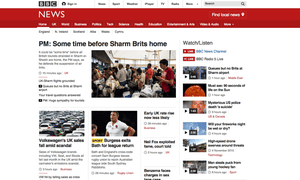The development of new/digital media means the audience is more
powerful in terms of consumption and production. discuss the arguments for and
against this view.
There have
been many changes and developments in technology and the new/digital media
which has created a new platform for audiences and institutions to adapt
to. The audience have gained more power and a place to interact and grow whilst
getting the knowledge they need in a much more convenient way. This has
allowed them to gain more power in terms of consumption and production.
However, this can be argued as different perspectives have different views on
how much power the audience have.
A Marxist
perspective would argue that the so-called “information revolution” has done
little to benefit audiences or to subvert the established power structures in
society. Far from being a “great leveller” (Krotoski, 2012) as many have
claimed, it has merely helped to reinforce the status quo by promoting dominant
ideologies. The most popular news website in the UK by a considerable margin is
the ‘Mail Online’, which receives more than 8 million hits every month and is
continuing to expand rapidly – with forecasts that it will make £100 million or
more in digital revenues in the next three years. Similar to its tabloid print
edition, the website takes a conservative, right-wing perspective on key issues
around gender, sexuality and race and audiences appear to passively accept what
the Marxist theorist, Gramsci, called hegemonic view. When one of their chief columnists,
Jan Moir, wrote a homophobic article about the death of Stephen Gately in 2009
there were Twitter and Facebook protests bit, ultimately, they did not change
the editorial direction of the gatekeepers controlling the newspaper.
A pluralist perspective
would argue that the audience has the ultimate power in terms of production and
consumption. This is due to the face that audiences are seen as capable of
manipulating the media in many ways according to their needs and having access
toThey are able to ‘conform, accommodate, challenge or reject’ (Gurevitch et
al). According to pluralists the audience is active and can choose and select
the media they want to consume as we have free will and are not controlled.
During the Arab spring protests, many people in Egypt, Tunisia and Libya has
started uprisings to get what they want, through this they managed to achieve
democracy and get their voices heard which shows how important and powerful the
audience are. The pluralists see the internet as “the most important medium of
the 20st century” (Briggs and Burke) which can be used to find out
any information needed in a more convenient way. This fits in with the uses and
gratifications theory of surveillance (Blumer and Katz). The use of citizen
journalism has created more UGC (user generated content) which has become
increasingly common. An example of citizen journalism is the death of Ian
Tomlinson which was carried out by a police officer. A member of the public
filmed the incident, which The Guardian then released soon after. This created
major controversy over the case This has also given us the ability to share our
views on more platforms such as on blogs. “The internet has given readers much
more power…the world is changing and newspapers have to adapt” (Rupert Murdoch,
Newscorp) which shows that newspapers itself are not doing so good as it is the
audience who determines the success of these businesses. This has resulted in
the “mutualisation of news” (Rushbridger), which tells us that it is not just
the gate keepers who produce news but also the audiences as it is mutual and
top down.
Another Marxist
perspective would argue that audiences do not have the power, instead what they
have is an illusion of autonomy as they are manipulated by thinking they have
power when they don’t. The audience are known to have a false consciousness.
Marxist theorists tend to emphasise the role of the mass media in the
reproduction of the status quo. They do this by Gramsci’s theory of hegemony by
using the media to promote hegemonic ideologies and ensure dominance of certain
classes. This ensures that ultimate control is increasingly concentrated in
wealthy corporations and media conglomerates for example according to Lin and Webster,
the top 5 of all websites accounted for almost 75% of user volume which supports
Paretos law of the minority of media producers serving a majority of consumers.
News Corp, the multi-national news company (who have revenue of $33billion) are
seen as a media conglomerates. ‘Hellion is encapsulated in the internet’ and
being able to escape the internet is causing the audience to ‘dumb down’. Also web
pages and blogs are like a million monkeys typing nonsense (Andrew keen: cut
out of aperture – the internet is killing our culture) which means how the
audience does not know what they are doing. They think they have control in
what they are doing but they do not have the power.
Pluralists see
society as a system of competing groups and interests, from which none of them
are predominate (i.e. classless). Pluralists go against the Marxists idea of autonomy
being an illusion as according to pluralist’s media organisations are seen as enjoying
an important degree of autonomy from the state which means they actually benefit
from the audience and that the power is in their hands. People are able to make
videos and upload them on YouTube, without even having to sign any deals or get
in touch with famous people, they can still gain several subscribers and gain
hundreds of views. An example is an online fashion and beauty blogger called
Zoella. She currently has just under 7 million subscribers and her videos have
307,946,467 views. After becoming so popular through her YouTube channel,
Zoella has now released her own book called 'Girl online' which sold 78,000
copies in the first week.
Marxists
believe in capitalist society, where the bourgeoise exploit the proletariat. In
the world of news, institutions and companies remain dominant and have power
over their audiences, who have no control. An example of this is the fact that
audiences feel more powerful as they can comment on articles found on online
news. Although audiences can comment what they want, the comments are still
regulated by the news institutions and they have the power to take it down if
they find it inappropriate. Also, although audiences have more freedom and
power to create their own media online, they still use websites such as Google
and YouTube which are owned by dominant corporations. A theorist who agrees
with this is Pareto as he stated that ''a minority of (media) producers always
serve a majority of consumers. This ties in with Pareto's 80/20 rule, where he
stated that 80% of wealth is owned by 20% of the population. Furthermore the Sun
newspaper helped win the conservative election which was shown in there
newspaper article, ‘It was the sun wot won in). Which shows that the sun
newspaper is very powerful as it has been able to control the audiences using
the hypodermic needle by injecting information into the audiences mind. The
newspaper companies are also seen as opinion leaders as according to the two
step flow model audiences are influenced by the opinion leaders in the media
who immediate how the audience re-acts by voicing their own views in a subtle way.
A pluralist on
the other hand would argue that Marxists’ belief that we live as puppets who
are controlled by a capitalist society who use us to serve the elite class is
wrong as we are free agents who can control our own actions and choices, including
the type of media we consume. More and more news organisations and social
networking sites have seen a massive increase in UGC as well as
big institutions adapting and changing. An example of freedom of
speech and User generated content is the Ferguson story where within 3 days 6
million tweets are made on twitter about what had happened and was also
trending not only but the police have admitted that they have lost control of
the story. This links back to Briggs and Burke their theory was that new and
digital media is the most important medium of the twentieth century, user
generated content has allowed for this to happen and provide justice.
In Alain de Botton's view the media is powerful in shaping how we view society. The media is a form of manipulating the audience which links to Marxism and hegemony because due to the fact that a high majority of the audience do not know how to decode the news and therefore follow it as a form of hegemony without knowing that they are consenting to this way of keeping and maintaining the status quo in society. Pluralism and new technology gives the audience a change to find out news themselves and also create their own unbiased news through UGC and citizen journalism which goes against de Botton's view of the audience being manipulated by the audience.
in conclusion, this
shows that the audience now have more power over other institutions and the
media which is my belief too. The changes in new/digital media have provided us with a bigger
platform to be free to be ourselves without being controlled and restricted which has given the audience more power in consumption and production.








